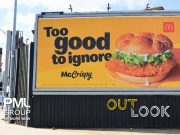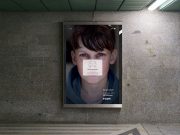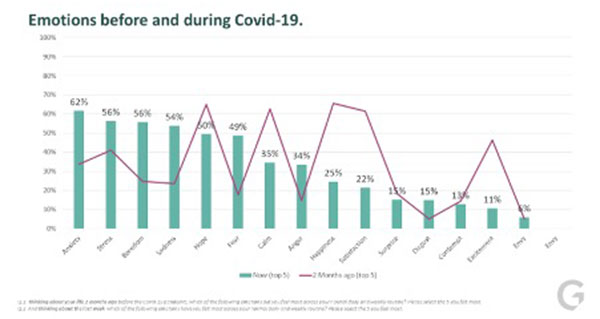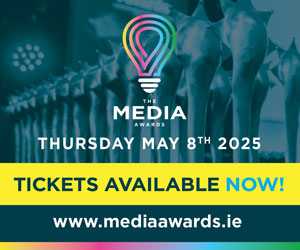Mark Nolan, director of Genesis writes about the findings of research carried out by the firm into the nation’s mindset and what the three truths that companies and brands need to embrace in the emerging post-Covid landscape.
It is clear that Covid-19 is a transformative event of epic proportions on many fronts. Ireland has been locked down for two months, and life as we know it has changed.
As I write, the country is beginning the 5-stage process of unlocking, Many are asking us about what will be the same as before and what will be changed permanently. And more importantly, what choices will have to made to survive and thrive in the future.
Whatever emerges will be strongly shaped by the shift in our individual and collective values, perceptions, feelings, priorities and decision-making processes. And these things are affected by how each of us is experiencing the effects that the pandemic is having on ourselves, our loved ones, our communities, our businesses, our sports, our schools and our everyday lives. We don’t yet know what will dictate the needs, wants and aspirations of people over the coming weeks, months and years. But we do know that there will be difficult trade-offs and choices to be made in personal and family life, in businesses and work- places, as a society and as a nation.
Those who understand the dilemmas which are being wrestled with will be best placed to have real insight into the zeitgeist. We believe this understanding is absolutely critical to enable businesses and organisations shift and respond, remain relevant and create value into the future.
Now > Next, a Genesis perspective
Genesis has been closely watching how Ireland has been responding to life before and during the lockdown. To get underneath the obvious, we conducted our own national representative survey to delve into how people are experiencing this extraordinary time. We want a deep understanding of what the impact really is – how are people experiencing life in these circumstances? Who and what is helping? What do people long for? What are their fears and hopes as the lockdown lifts? We want to unearth the factors that will really shape the journey to recovery so that we can help our clients to respond with agility and speed, securing their brands and delivering value for their businesses, organisations and the wider economy.
We designed our research study to surface the trade-offs and tensions that are emerging and that must be addressed in order to re-calibrate, re-boot and if necessary, re-build businesses and brands. Below are just some of the themes emerging:
We are all experiencing a different pandemic
Government communications insist that ‘we’re all in this together’ and while this is true, our research suggests that everyone’s reality is not the same and we are all, in fact, experiencing very different impacts and consequences. For example individual and family experiences have been significantly affected by the factors below:
Lockdown: Those who are cocooning (22%) or have self-isolated (30%) versus those who are less restricted.
Health: Those who suspect they or someone in their family has had Covid-19 (5%) versus those who have not had any first-hand experience of the virus.
Finances: Those who have seen household income cut (32%) and jobs in their household lost (18%) versus those who have been unaffected financially.
Frontline: Those in frontline health and essential services and their close families (41%) versus those fighting the virus by staying at home.
Nursing homes: those with loved ones in nursing care settings (9%) versus those who do not.
The way in which different individuals and cohorts of society are experiencing the impacts of Covid-19 will undoubtedly shape their perspectives in very different ways over the coming months.
We’ve coped relatively well, for now
As a nation, Ireland has coped well to date, and Irish people are very proud of how the country responded overall (72%). Emotionally and psychologically, however, Irish people have shifted from a state of happiness, satisfaction and hope to a state of heightened anxiety, stress, boredom, sadness, and fear in a very short time.
For now, Irish people are doing relatively well despite all that they’ve had to endure. Most have a sense that others are finding it harder and having it worse than themselves across a number of stress points such as physical health, mental health, household finances and household relationships. This gives the majority of Irish adults a shared appreciation that in some respects things could be worse. Looking at others who are, comparatively speaking, in a more difficult situation than themselves seems to have helped people to cope with and accept the constraints on their own lives. For many people, the perspective of time will be required to help process the impact of the experience on important aspects of their lives – health, relationships, personal finances, work, travel, recreation and so on.
Our research analysis clearly shows that Irish adults are in a limbo between shock about what’s just happened and the dawning realisation of the difficult new realities that must be faced in the foreseeable future. We believe that this unprecedented combination of emotional and financial impacts (and for which no one is to blame) is likely to create a sea change in perceptions and behaviours that will have a big knock-on effect across business and the wider economy. Moreover, the physical changes that will be increasingly evident in public spaces and work places will likely act as an ever-present reminder that ‘it hasn’t gone away, you know.’
Great expectations, but this time it’s different
Our study shows very significant values shifts. For example, we see a major increase in the importance now being placed on spending time with family (+59%) and health and wellness (+54%), and a significant decline in the importance being placed on having the latest fashion/clothes (-55%), and being connected on social media (-18%). These data confirm the attitudinal patterns that generated the General Election result and suggest the green shoots of a real commitment to enriching Ireland’s social capital.
Irish adults believe that the pandemic has been a wake-up call for everyone to act on climate change and reduce carbon emissions (61%), and commit to greater equality through providing better access to housing, education and healthcare (60%). Of course, it’s not new to have such aspirations, but what is intriguing is that the inertia that has kept things stable for so long and to which societal and commercial norms seem to have been hardwired, has been uprooted with such speed. It remains to be seen if these emerging aspirations and values result in long lasting behaviour change that, of themselves, demand different responses from government, from business and from society. If not, then shape of the change will surely be less significant than many pundits claim it will be.
What’s next and how to win?
What is certain is that our old certainties are anything but. The human race has been fast forwarded into ambiguity and anxiety and most Irish people have accepted the ensuing changes for the sake of our collective wellbeing. Over a short number of weeks, we have seen huge decisions being taken by a select few that affect all, in big and small ways, at every life stage. What would have been unthinkable (and certainly undoable) just this time last year, became possible. No section of society has been left untouched. But as Ireland emerges from the shock stage and the focus shifts from lives to livelihoods, there will be far greater scrutiny and far greater debate. If we’ve lived to fight another day, then that ‘other day’ really matters. For businesses and organisations, this means that purpose will become centre-stage, not ‘nice to have’. And brands will have to be truly purpose driven, in order to demonstrate their value for customers.
These are only some of the dynamics that will shape what is to come. The choice of how to respond to those dynamics is up to decision-makers.
Put simply, organisations and brands need to acknowledge and embrace three Covid-19 truths:
Acknowledge and embrace the rapidly changing landscape that is here for the foreseeable future.
Accept that the world is going to be reframed and not rewound to what it was.
Adopt a ‘reimagine mindset’ focusing on the value that can be created as the future unfurls – instead of a ‘remember mindset’ which focuses on what has been and is never coming back.
We have many other areas covered in our study, on leadership, policy, society, brands, communications and politics.
This article is a summary of a research carried out by the Dublin-based consultancy Genesis. For a copy of the full report contact Mark Nolan mnolan@genesis.ie or to find out more about Genesis visit www.genesis.ie























